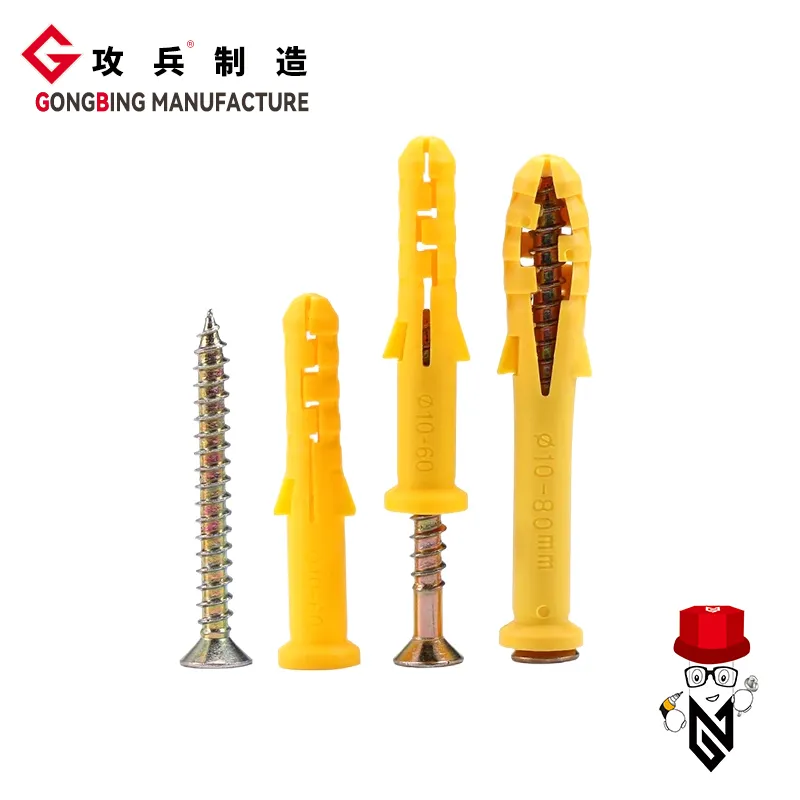Weatherproof Plastic Expansion Anchors for Outdoor
In outdoor and coastal environments, the durability of fastening systems is tested by relentless exposure to moisture, salt, UV radiation, and temperature fluctuations. Plastic expansion anchors, expanding plastic anchors, and plastic expanding screws have emerged as vital solutions, offering corrosion resistance and adaptability to harsh conditions. This article explores the innovations, performance standards, and wholesale strategies that make these anchors indispensable for construction projects in demanding climates.

Material Innovations in Weatherproof Plastic Expansion Anchors
The effectiveness of plastic expansion anchors in outdoor and coastal settings hinges on advanced polymer formulations. Traditional plastics degrade under UV exposure or saltwater corrosion, but modern materials like:
Fiber-reinforced nylon: Enhances tensile strength while resisting deformation.
UV-stabilized polypropylene: Prevents brittleness and cracking under prolonged sun exposure.
Anti-corrosion additives: Protect against saltwater penetration in coastal applications.
These materials ensure expanding plastic anchors maintain grip in substrates like concrete, brick, or masonry, even after years of exposure. For example, anchors infused with carbon black exhibit superior UV resistance, making them ideal for rooftop installations. Wholesale suppliers prioritize these polymers to meet the demands of bulk orders for infrastructure projects like boardwalks or seaside railings.
Moreover, the addition of certain additives enhances the durability and corrosion resistance of the anchors. Polymers blended with antioxidants, for instance, can withstand harsh weather conditions and chemical exposure, ensuring long-term stability. Manufacturers also incorporate flame retardants to meet safety regulations, particularly in high-risk areas such as commercial buildings or industrial sites.
Design Features Enhancing Durability in Coastal Environments
Beyond material choice, the design of plastic expanding screws plays a critical role in weatherproofing. Key features include:
Sealed expansion sleeves: Prevent water ingress, reducing freeze-thaw damage in colder climates.
Ribbed or fluted shafts: Increase surface area for better adhesion in porous or crumbling substrates.
Integrated washers: Create a watertight seal between the anchor and fixture.
For coastal applications, expanding plastic anchors often incorporate dual-stage expansion mechanisms. These allow the anchor to adjust to substrate irregularities while maintaining a secure hold despite shifting sands or erosion. Wholesale buyers should verify that bulk orders include anchors with these design elements to ensure long-term reliability across large-scale projects.
Performance Standards and Testing for Plastic Expansion Anchors
To guarantee performance, plastic expansion anchors must meet rigorous industry standards:
ASTM E488: Evaluates pull-out strength and shear resistance under cyclic loading.
Salt Spray Test: Assesses corrosion resistance in saline environments.
UL 94V-0 Fire Rating: Ensures non-combustibility for safety in dry, high-heat areas.
For instance, anchors rated for coastal use often undergo 1,000-hour salt spray tests to simulate years of exposure. Wholesale procurement teams should prioritize suppliers providing third-party certification reports, ensuring compliance with regional building codes like the International Building Code (IBC) for hurricane-prone zones.
Wholesale Considerations for Plastic Expanding Screws
Procuring plastic expanding screws at scale requires strategic planning to balance cost, quality, and logistics:
Bulk Customization: Work with manufacturers to produce anchors in standardized lengths and diameters, reducing installation complexity.
Packaging: Opt for UV-resistant vacuum-sealed packaging to prevent material degradation during storage or transit.
Supplier Partnerships: Collaborate with suppliers offering batch testing and traceability, critical for maintaining quality across thousands of units.
A case study in Florida demonstrated that bulk orders of expanding plastic anchors with pre-assembled stainless steel screws reduced installation time by 30% in a coastal condo project. Additionally, economies of scale can lower per-unit costs by up to 25%, making high-performance anchors accessible for budget-conscious developers.
FAQ: Weatherproof Plastic Expansion Anchors in Harsh Climates
How long do plastic expansion anchors last in coastal environments?
When made with UV-stabilized polymers and anti-corrosion additives, plastic expansion anchors can last 10–15 years in coastal areas, depending on exposure intensity and substrate quality.
Can plastic expanding screws withstand hurricane-force winds?
Yes, if rated for high pull-out strength (≥1.2 kN) and installed correctly in dense substrates. Always verify compliance with local wind load regulations.
Are expanding plastic anchors suitable for underwater applications?
No. While resistant to moisture, expanding plastic anchors are not designed for permanent submersion. Use marine-grade stainless steel anchors for underwater use.
What substrates work best with expanding plastic anchors?
They perform well in concrete, brick, and stone. Avoid porous materials like aerated concrete unless paired with epoxy fillers to enhance grip.
How can wholesalers ensure consistent plastic expanding screws quality ?
Require suppliers to provide batch-specific test reports for pull-out strength, UV resistance, and salt spray compliance. Random sample testing further ensures consistency.
Plastic expansion anchors and plastic expanding screws are redefining resilience in outdoor and coastal construction. By leveraging advanced materials, intelligent design, and rigorous testing, these anchors provide reliable, cost-effective solutions for harsh environments. For wholesalers, prioritizing certified, bulk-ready systems ensures projects meet durability demands while optimizing budgets—proving that even in the face of nature’s challenges, innovation anchors success.
-
Weatherproof Plastic Expansion Anchors for OutdoorNewsJun.06,2025
-
Sustainability in the Supply Chain: Eco-Friendly TEK Screws ProductionNewsJun.06,2025
-
Load-Bearing Capacity of External Insulation FixingsNewsJun.06,2025
-
Double Head Bolts: Enhancing Efficiency in Industrial MachineryNewsJun.06,2025
-
Corrosion Resistance in Chipboard Screws: Coatings for Wholesale DurabilityNewsJun.06,2025
-
Butterfly Toggle Bolts : Enhancing Structural ResilienceNewsJun.06,2025
